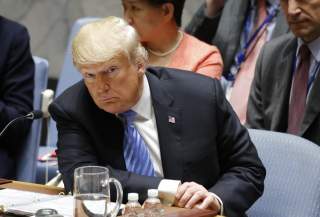Trump's UN Speech Hurts America and the International System
America threatens to let everyone fend for themselves.
In front of the United Nations General Assembly on September 25, President Donald Trump made it clear that the United States has thrown away its moral compass and abdicated its leadership in the international community.
During his speech, Trump preached the gospel of “sovereignty,” stating that “the United States will not tell you how to live, work, or worship. We only ask that you honor our sovereignty in return.” He later proclaimed that the “the whole world is richer” and “humanity is better” because countries are pursuing “their own unique visions.” While these intentions seem honorable at first inspection, Trump has used the vocabulary of diversity to walk back America’s commitment to democracy and human rights around the globe. Instead of promoting democratic values, as is part of the State Department’s vision, the United States has now stated that authoritarian governments can do as they please.
The speech sounded as if it could have been given by a dictator who wanted the world to know why other countries had no business interfering in their country’s repressive domestic policies and bore a striking resemblance to China’s “non-interference” policy. It’s particularly ironic and deeply disturbing that Trump has couched his speech in the language of equity and diversity given his promotion of white supremacist talking points and use of racist language against immigrants.
Trump reiterated this about-face from democracy as he praised dictators and authoritarian leaders throughout his speech. He thanked North Korean dictator Kim Jong-un for his “courage” with regards to negotiations with the United States, even though Kim’s regime imprisons and executes dissidents. He said he has “great respect and affection” for Chinese leader Xi Jinping, whose government ruthlessly censors and punishes dissidents and is currently detaining upwards of one million members of the Uyghur ethnic minority group. Most jarring was his use of King Salman of Saudi Arabia and his son, Mohammad bin Salman, as shining examples of the beauty of diverse systems of government. He praised their governmental reforms while ignoring that the country seeks to execute a number of peaceful activists.
Trump used the framework of sovereignty to not only condone illiberal regimes around the globe but also to relinquish the United States’ existing commitments to the international order. Sovereignty is why the United States cannot accept “uncontrolled migration” from Latin America, even though many of those migrants qualify as asylum seekers and are fleeing humanitarian crises. Sovereignty is why the United States can no longer support the International Criminal Court. Trump has decided that the international system has fundamentally infringed on America’s rights, and the United States will not take it anymore.
It’s alarming that this theory of sovereignty only appears to extend into the humanitarian realm. Despite claiming that the United States will not tell other countries what to do or how to work, Trump alluded to China as he ranted about the unfairness of state-owned enterprises and industrial planning. Trump did criticize socialism in Venezuela, calling for the country’s democratic reform and highlighting its humanitarian crisis. However, this statement on the humanitarian situation appeared to be borne out of economic concern for the country’s oil. Apparently, human rights only matter when there is an economic gain for the United States.
Through his speech, Trump made it clear to the world that he thinks the United States has been taken advantage of through the international system and that it will no longer put up with these gross injustices. The United States is being gouged by OPEC, having its wealth “plundered” by China, and contributing too much to the United Nations. While some of the president’s complaints might have merit, his response to withdraw from any multilateral deal he did not make is an example of throwing the baby out with the bathwater.
The International Criminal Court, the United Nations Human Rights Council, the Joint Comprehensive Plan of Action, the Trans-Pacific Partnership, and the Paris Agreement were all institutions that democratically-elected representatives of the United States entered or attempted to enter. Now, instead of having a seat at the table as reforms are made or details are ironed out, the United States and its views are absent. While Trump believes this might protect the interests of the United States since it won’t be beholden to foreign powers, it actually means that America’s interests are of less import than they would have been had the United States been an active player.
As illiberal forces seek to undermine democracies around the world and rile up xenophobic and authoritarian populist impulses, the United States should be leading the charge to assist governments that are by the people, for the people. Instead, Trump has made it clear that it’s every country for themselves and he doesn’t care as long as it doesn’t affect America’s bottom line.
Abby Bard is a research assistant for National Security and International Policy at the Center for American Progress.
Image: U.S. President Donald Trump listens as he chairs a meeting of the United Nations Security Council held during the 73rd session of the United Nations General Assembly at U.N. headquarters in New York, U.S., September 26, 2018. REUTERS/Eduardo Munoz

